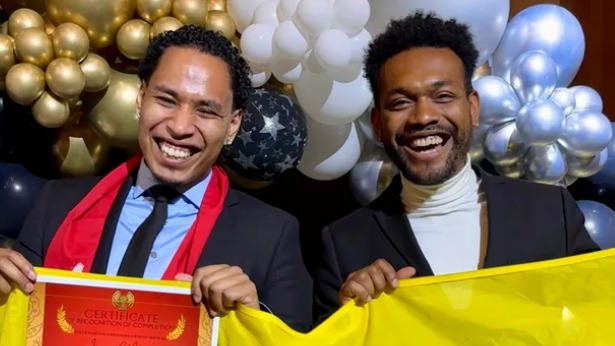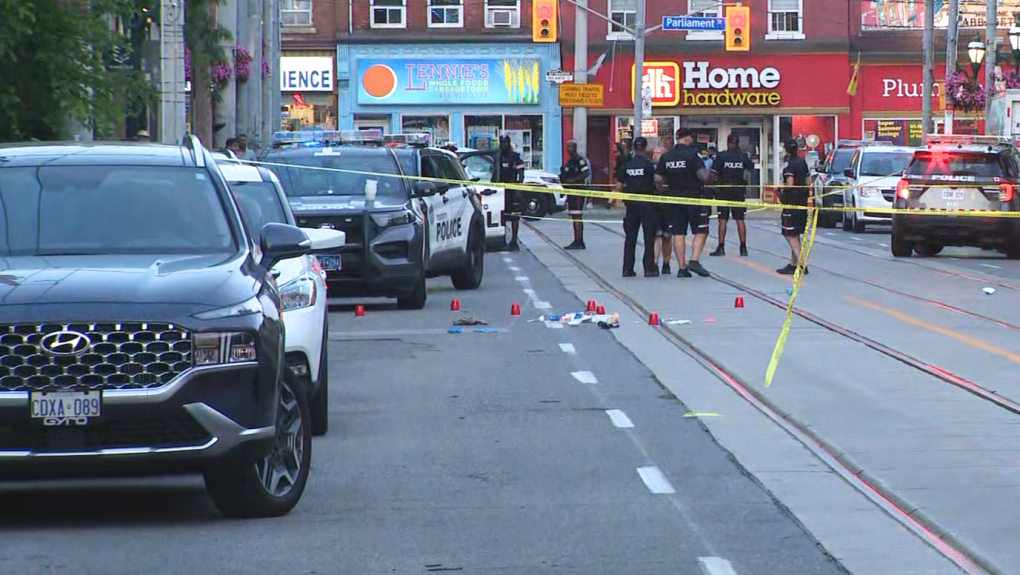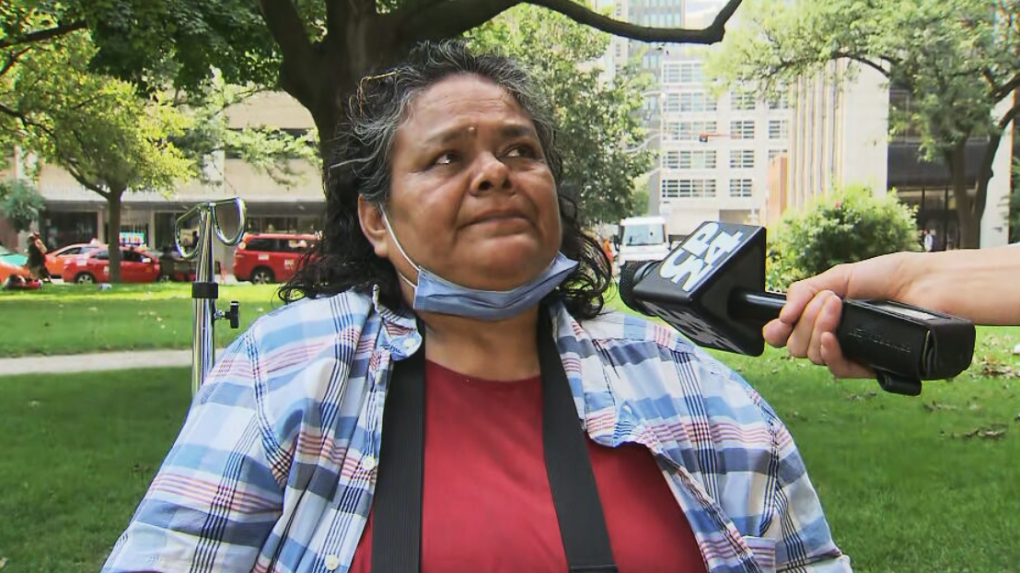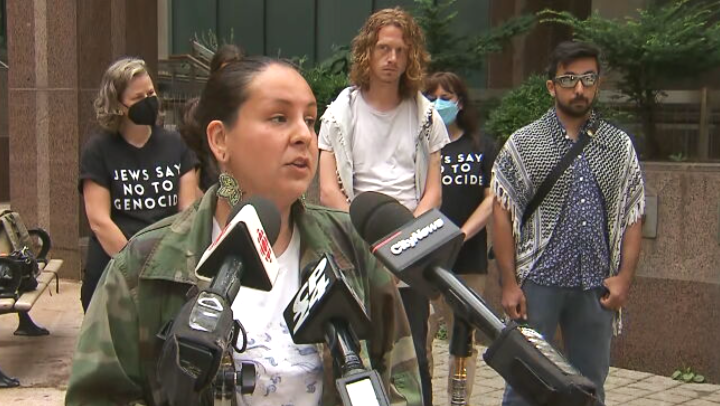The mother of a man shot by police officers in Toronto says her son was suffering from a mental health crisis when he was struck by gunfire, and that firearms should never have been part of the police response.
“I felt like I couldn’t breathe,” Cheryl Maxie, said, recalling the moment she found out her son, Tylor Coore, had been shot. “That’s not something a mother wants to wake up to — that your son has been shot by police.”
Coore, a 32-year-old Afro-Indigenous man from Whitebear First Nation, was shot by Toronto police near Carlton and Parliament streets last Tuesday evening.
The Special Investigations Unit (SIU), which probes police incidents involving death or serious injury, has invoked its mandate and is investigating.
 Tylor Coore, 32, can be seen, right, alongside his brother, Jama Maxie, left. Coore is the intensive care unit after being shot by Toronto police last week. (GoFundMe)
Tylor Coore, 32, can be seen, right, alongside his brother, Jama Maxie, left. Coore is the intensive care unit after being shot by Toronto police last week. (GoFundMe)
Police have said they were called to the area for reports of a man armed with a knife. At some point during the interaction an officer discharged their firearm, striking Coore.
Coore was transported to St. Michael’s hospital with serious injuries and has since undergone multiple surgeries, according to his family.
He remains in custody in the intensive care unit.
 Tylor Coore, 32, was hit by police gunfire at Parliament and Carleton streets in Cabbagetown on July 23. The SIU has invoked its mandate and is investigating the incident. (CTV News)
Tylor Coore, 32, was hit by police gunfire at Parliament and Carleton streets in Cabbagetown on July 23. The SIU has invoked its mandate and is investigating the incident. (CTV News)
In a statement provided to CP24 this week, police said Coore was charged with two counts of assaulting a peace officer with a weapon and one count of possessing a dangerous weapon in connection with the incident. A spokesperson for the service said they could not give further comment while the matter was under SIU investigation.
In the aftermath of the shooting, Coore’s family wants answers on why their loved one was met with gunfire while in crisis.
At a press conference held outside TPS’ 51 Division on Friday, Maxie identified her son as the victim and explained that he lives with Schizophrenia. Coore was experiencing a mental health crisis the day he was shot and had been the one to call police for help, she said.
“My son had mental issues,” she told the crowd. “You know that there’s other ways of dealing with people with mental health.”
 Cheryl Maxie, mother of Tylor Coore, speaks to CP24 on Wednesday. (CP24)
Cheryl Maxie, mother of Tylor Coore, speaks to CP24 on Wednesday. (CP24)
The father of Regis Porchinski-Paquet, killed during an interaction with the Toronto Police Service in 2020, also took the microphone at Friday’s press conference.
The SIU previously cleared police of criminal wrongdoing in Porchinski-Paque’s death but the family has filed a civil lawsuit.
READ MORE: Regis Korchinski-Paquet’s family releases new video, files $10M civil lawsuit
“We should not have to be out here for Tylor,” Peter Korchinski said. “The police had no business doing what they did to him.”
On Wednesday, Maxie told CP24 she believes her son should not be facing charges in connection with the incident.
“That’s not what he needs. He needs help, he needs love, he needs community,” the mother said. “He doesn’t need to go to jail. That’s just going to make it worse.”
Redirect police funding to social supports: advocates
While they wait for Coore to recover, Maxie and her family are calling for new strategies to support vulnerable residents in Toronto’s downtown core.
“I just wish they would handle mental health, more cautiously, with more understanding, more compassionate,” Maxie said.
At a second press conference, held outside the Toronto Police Services Board meeting on Wednesday, advocates echoed those sentiments and highlighted concerns over the new Downtown Community Outreach Response and Engagement Team. The year-long pilot program, announced last month, brings together a team of nurses, nurse practitioners, and police officers to provide short-term case management, substance use responses, and health and social service referrals in the Yonge and Dundas area.
Speaking to reporters, harm reduction worker Mskwaasin Agnew called for funding to be redirected from the Toronto police into social services, reiterating points offered by her to the board at a public deputation about the program on June 24.
“I told the Police Services Board […] that people are going to die because the police are incapable of de-escalating people in mental health crisis,” Agnew told reporters. “I work at a safe injection site and not once in my work, have I ever had to restrain someone or put them in handcuffs, not once have I ever had to use a weapon to quote-unquote protect myself.”
“How many people have to die to understand that we need more funding for mental health care?” she asked.
 Mskwaasin Agnew, with the Indigenous Harm Reduction Network, calls for police reform outside of the Toronto Police Headquarters on July 31. (CP24)
Mskwaasin Agnew, with the Indigenous Harm Reduction Network, calls for police reform outside of the Toronto Police Headquarters on July 31. (CP24)
As Coore’s family prepares to support him through his criminal case, they have launched a GoFundMe to cover legal expenses.
“We come from very little,” his brother, Jama Maxie, wrote. “But [one thing] I do know is I want my brother to be represented with respect, competency and compassion as he awaits hearings.”
At the time of publication, the family had raised just under $25,000 of their $40,000 goal.